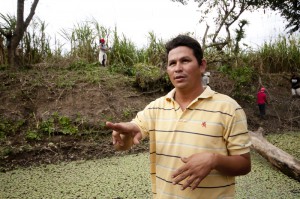El Salvador: a team of technicians and community leaders mark five years of emergency response

This blog was written by Tjarda Muller, Oxfam America’s communications officer in San Salvador.
I’m thinking back six months ago—to February—when I was in the field with Elizabeth Stevens, Oxfam America’s humanitarian communications officer. Together with technicians from our partner organizations, we were visiting rural communities across El Salvador. The weather was hot and a big bottle of water was my constant companion. Water: a commodity so ordinary for many of us. But there in remote areas, water doesn’t flow fresh and clear out of a tap. It comes from hand-dug wells and is often highly contaminated. If Elizabeth or I were to drink it, we’d definitely get sick. But so do the people who have no choice but to drink it. Contaminated water isn’t something one’s body easily adapts to and gastrointestinal diseases are common in these villages. During flooding, which happen on a yearly basis, contamination gets even worse. And so do the diseases.
That’s why Oxfam America started training a team of 17 technicians from partner organizations to become specialists in WASH, or water, sanitation and hygiene promotion in emergencies.
Now, during this month of August, the WASH team is celebrating its fifth anniversary. The team has been trained in installing water tanks after emergencies, monitoring water quality, cleaning contaminated latrines and hand-dug wells, fumigation, garbage management and pest control. The reach of the team is national and each member can be deployed instantly to where disaster strikes.
Over the years, the team has grown and includes now, apart from the 17 technicians, as many as 150 community leaders.
“Community leaders have the local knowledge they need to get things done,” says Karina Copen, Oxfam America’s humanitarian officer. “By bringing in international experts for every emergency, you’re resolving short-term needs but not contributing to sustainability—to people solving their own problems. When local people respond to emergencies, it’s faster and comes with cultural awareness, and the knowledge and capacity are installed in the country.”
Melvin Elias Fuentes is one of the community leaders on the WASH team. He told me about his experience during a severe storm that hit last October. “During the emergency, I did damage and needs assessments in all the communities in this area. Even though I had only had two WASH trainings at that point,” he said. “Oxfam loaned us two tanks, and I installed them. We made arrangement with ANDA (national water authority), the mayor’s office, and the Ministry of the Interior to fill them up. I also supervised cleaning of latrines. We had fumigation campaigns to control the mosquitoes.”
During my field visit in February, as I talked to different members of the WASH team, I became keenly aware of the vital services the members provide, not only during the emergency but also in the reconstruction period afterwards.
“Being on the WASH team—I love it. It’s a great experience,” Fuentes said. “I’m happy because I can do good, while doing what I love.”
With that kind of enthusiasm, imagine what the WASH team will be able to accomplish for Salvadorans in the next five years.